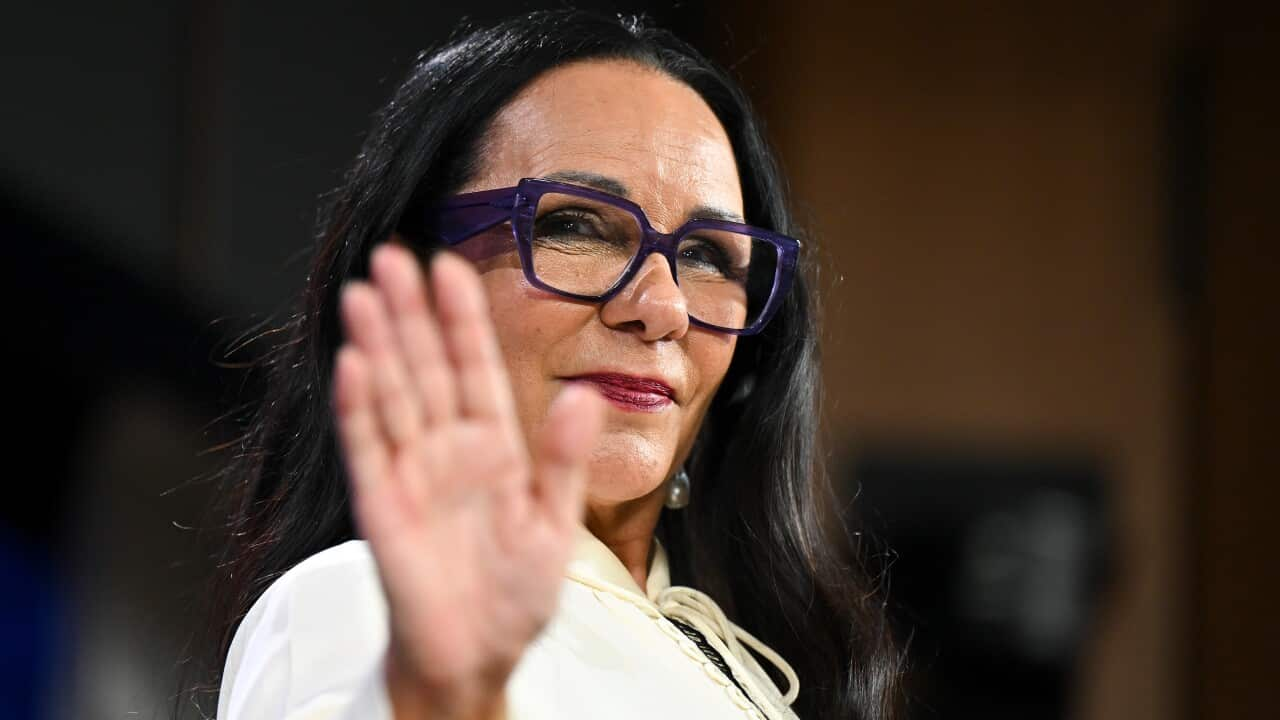KEY POINTS:
- Lidia Thorpe's Blak Sovereign Movement has released its own Voice pamphlet.
- It takes aim at the official pamphlets of both Yes and No campaigns, but urges Australians to vote no.
- Thorpe was excluded from discussions on the official No pamphlet.
Senator Lidia Thorpe's Blak Sovereign Movement (BSM) has attacked the Voice to Parliament as "nothing but cheap window dressing", but also decried the "racist" No camp in its own referendum pamphlet.
The BSM released its outline on Thursday, after being excluded from the No camp's official document, urging Australians to vote down a referendum to be held in the final quarter of this year.
The Australian Electoral Commission (AEC) published official pamphlets from the Yes and No camps online on Tuesday, with hard-copies to be mailed to every Australian household in the coming months.
But Thorpe, who objects to the Voice on substantially different grounds to the Coalition, was not included during the creation of the No camp's argument, and the BSM says both pamphlets will "rightly end up in the bin".
In its 8-page response, the BSM - which Thorpe says she represents - claims many "well-meaning folk" have either felt "coerced" to support the Voice, or afraid to vote against it due to "the racism of the conservative No campaign".
The document says the proposal, which would not have veto power over Australian parliament, is a distraction from the "keys to real change": Truth-telling and the recognition of Indigenous sovereignty.
"The Voice is nothing but cheap window dressing to constitutional recognition ... After 230 years of invading and illegally occupying our land, the best the colonial government can offer us is a token advisory body and assimilation into their constitution," it says.
"It is an insult to our ancestors that have maintained our Sovereignty and culture. It is an insult to our warriors that died resisting the invaders and colonisers. It is a threat to the birthright of our children, and our children’s children, to their sovereign rights.
"Do not be bullied by the Yes campaign and do not be intimidated by the racists. Do not let yourself be emotionally blackmailed. There are many good reasons to say No."

Senator Lidia Thorpe says the 'powerless' Voice is a distraction from the real drivers of change. Source: AAP / Mick Tsikas
What are the BSM's objections?
The essay outlines four main objections to the Voice, saying:
- It is not an invitation from Aboriginal and Torres Strait Islander People
- It is not a step in the right direction, but "another powerless advisory body"
- It is a "destructive distraction" and would "absolve the government of its continued crimes"
- Recognition of sovereignty and Truth-telling are the key to real change
What does it say about the Yes camp?
The BSM says the government is ignoring significant areas of reform while it pursues the "powerless" Voice. It says it:
- Is not acting on recommendations from The Bringing Them Home Report and The Royal Commission Into Aboriginal Deaths in Custody
- Continues to approve mining projects and land clearing over the objections of Traditional Owners, such as the destruction of the Juukan Gorge in Western Australia
- Has allowed suicide, incarceration, and out-of-home care for children rates - all Closing the Gap targets - to worsen
Labor argues that by listening to the Voice as it creates policy, the government will be better equipped to improve outcomes for Indigenous people, including those outlined in the annual Closing the Gap report.
The BSM argues the Voice will ensure Indigenous people become scapegoats if outcomes do not improve. "It will mean victim blaming when a powerless advisory body (backed by mining companies) achieves, like those before it, nothing," it says.
The Voice was first called for in the 2017 Uluru Statement From the Heart, which resulted from the Uluru Dialogues - years of extensive dialogues with Indigenous communities across Australia.
While describing the Uluru Statement as "beautifully-worded", the BSM claims the process was "top down" and has "none of the legitimacy it purports to hold".
"They excluded people organisers disagreed with and did not come close to representing the diverse views and perspectives of First Nations communities," the BSM's essay says.
What does it say about the No camp?
The BSM has also rejected "fear mongering" from the No camp, which has claimed the Voice would pose "the biggest change" to Australian democracy in living memory and "no issue" would be beyond its scope.
"The proposed constitutional change is clearly worded to ensure parliamentary supremacy is maintained and the Voice would be powerless," the BSM said.
"This is baseless fear mongering. Its scope is entirely determined by the parliament. The parliament will decide its 'composition, functions, powers and procedures'."
The BSM also says the only legal risk the Voice would pose is to Indigenous sovereignty, despite multiple legal experts rejecting that claim.











